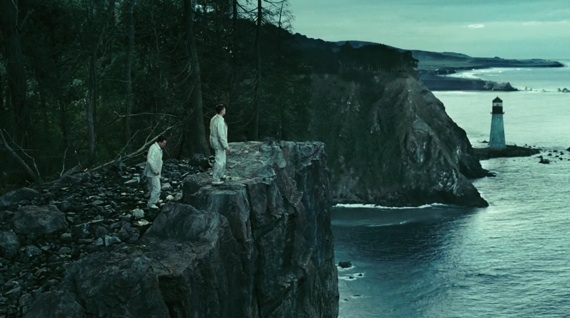 Warning: the following post contains spoilers.
Warning: the following post contains spoilers.Martin Scorsese's Shutter Island, from Laeta Kalogridis's adaptation of the Dennis Lehane novel, provides further evidence of the director's retreat from artistic relevance, following a decade in which the filmmaker's excesses overshadowed his accomplishments in Gangs of New York (2002), The Aviator (2004) and even 'best picture' winner The Departed (2006). Shutter Island proves no less distended in its narrative form, which is ironic certainly when one considers the film's clear indebtedness to the "b" film format that was itself distinguished by its relative economy. It is unclear precisely what lessons Scorsese imbibed from these films - save for his simulated rear-projections, overtly artificial mise-en-scène and conspicuous pulpiness - given the film's substantial narrative fat. Of course, more than your King Kong's (Merian C. Cooper and Ernest B. Schoedsack, 1933 - no "b" film in the truest sense, though a reference all the same) and Isle of Forgotten Sins' (Edgar G. Ulmer, 1943) of the world, Shutter Island owes, and indeed significantly refers to the films of Alfred Hitchcock and Stanley Kubrick (particularly the latter's The Shining, 1980), from which Scorsese's film generates its subjective modality, to say nothing of the 1940s Gothic melodramatic cycle instantiated by the thematically relevant Gaslight (George Cukor, 1944).
Indeed, Scorsese draws on Hitchcock's Marnie (1964) for its psychoanalytic denouement whereby Leonardo DiCaprio's U.S. Marshal Teddy Daniels comes to the learn the truth of his own traumatic past. In this way, Scorsese returns to the same crudely Freudian logic of his first feature Who's That Knocking on My Door (1967) - in the case of the earlier picture it was the Madonna-Whore complex - though to less immediately gratifying aesthetic effect. (Indeed, the 1967 film provides a notable intra-corpus point of reference thanks to its significant narrative fragmentation, which with the earlier picture more strongly recalls the contemporary work of Jean-Luc Godard.) Scorsese combines the personal trauma of Shutter Island, however, with the public trauma of Dachau, which gratuitously figures in recreations of the concentration camp (that Scorsese pairs with problematically lyricized murders of Nazi officers). As such, Scorsese finds another starting point in Alain Resnais's cinema of fifty years earlier - namely his similarly structured, comparative Hiroshima mon amour (1959). Then again, where the French director's cinema has improved with age, finding its most personal expression in Private Fears in Public Places (2006), Scorsese's seems to have moved in the opposite direction, moving from the first-person tenor of his earliest films to the less reflective generic exercises of his past two works.
This is not to say that Shutter Island does not instantiate a world view; again it proposes a meaninglessness in the face of Dachau and the violence that as always Scorsese claims as ubiquitous, a 1950s, Hydrogen bomb-era existentialism (and perhaps even a nihilism arguably), even as DiCaprio's lead "bears witness," in the words of film scholar Lisa K. Broad, to the sins of both the Nazi's and those of Shutter Island. On this basis even more than with the film's somewhat uneven application of style, Shutter Island emerges as the work of an auteur - albeit of a maker seemingly in his decline. Shutter Island also introduces a politics in the film's adoption of a HUAC-centered conspiracy that the protagonists fear will some day produce sins comparable to those of Nazi's. To the extent that one takes this governmental crime seriously, the most viable current equivalent might just be the muddled-headed thinking of 9/11 "truthers." Then again, since this conspiracy is revealed to be toothless, one might just as well conclude that Scorsese has come to this very conclusion on his own. Commensurate with the film's philosophy, grand theories ultimate cannot explain the world's sins.
No comments:
Post a Comment